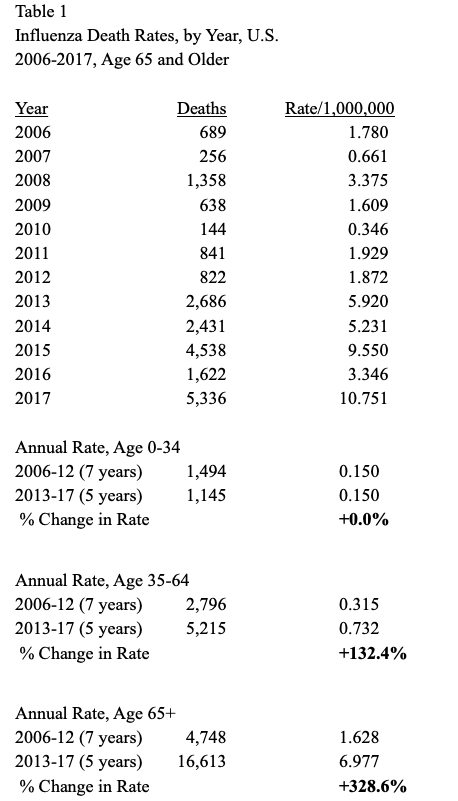=====================================================================
Source Article:
Should Seniors be Getting the Flu Shot?
https://healthimpactnews.com/2019/should-seniors-be-getting-the-flu-shot/
=====================================================================
by Brian Shilhavy
Editor, Health Impact News
Earlier this year, an epidemiologist who has published over 30 articles in medical journals approached me with concerns about soaring death rates among seniors due to influenza.
This scientist was concerned because a correlation was seen between the FDA approval of the Fluzone High-Dose flu vaccine for the elderly in 2009, and annual deaths recorded among seniors due to the flu.
Knowing that his research cast a negative light on the high-dose flu vaccine for seniors, he knew that mainstream media sources would never publish his research, and turned to Health Impact News. We published his research anonymously:
Soaring Elderly Flu Death: What Role Did the Stronger New Flu Vaccine Play?
When the government and the corporate-sponsored mainstream media refuse to publish any negative information regarding the flu vaccine, lives are endangered.
The government’s own statistics show that the annual flu vaccine is by far the most dangerous vaccine in the U.S., with millions of dollars in settlements paid out each year for injuries and deaths due to the flu shot. (We have a list of these reports here.)
It is rare these days when a corporate media source reports a flu death and gives the vaccination status of the one who allegedly died from the flu.
But ABC 10 in San Diego this week reported that an 86-year-old woman died from the flu, and was also vaccinated with the flu shot. (Source.)
Since it is rare for the media to link deaths to any vaccines, just how common is it for seniors to suffer from the flu shot?
In 2014, a nurse working in an assisted living facility in Georgia contacted Health Impact News when all of the residents allegedly developed a fever after receiving the flu shot, and within one week 5 of the residents had died.
This particular residential facility was treating seniors suffering from Alzheimer’s and Dementia. When we published the story the facility threatened to sue us, but one of the family members of one of the deceased residents contacted us and verified the information. The family did not want to go public, because:
We fear being sued for defamation and libel. Several prominent Atlanta attorneys and doctors have their loved ones at the community we certainly don’t have the means or ability to defend ourselves against them. (Story here.)
Here are some statistics about the high-dose flu vaccine for seniors that you are not likely to find from the corporate media, nor your doctor.
After FDA approval of the high-dose flu shot for the elderly, use of the new vaccine began slowly. In the period 2010-2012, the first three years after approval, just 18.4% of elderly Americans receiving flu shots received the high-dose version (McGrath, 2015). The numbers of 25% and 32% in 2011 and 2012 likely mean a much larger percent in years after.
One important way to test for any effect that High-Dose Fluzone had on elderly Americans is to review death rates in the periods before and after it was introduced. The CDC maintains a database of all deaths of U.S. residents; in mid-2019, the database covered all years from 1968-2017.
Table 1 is a comparison of influenza deaths for the periods 2006-2012, when less than 10% of elderly Americans vaccinated for the flu had High-Dose Fluzone, and 2013-2017, when a much larger (but unknown) percent of those vaccinated were given High-Dose Fluzone (Centers for Disease Control and Prevention, 2019).
Prior to 2013, fewer than 1,000 elderly Americans died from the flu in all but one year. But in the most recent five years available, the average jumped to over 3,000 per year, exceeding 5,000 in the most recent year (2017). The 2013-2017 flu death rate among Americans over 65 jumped 328.6%, or more than four times than it was in the period 2006-2012.
The influenza death rate did not change among Americans age under 35, while it rose 132.4% (more than doubled) among those age 35-64.
Additional information may be pertinent to this unusual trend:
-
Large increases in elderly flu death rates occurred among all major racial and ethnic groups (white, black, Hispanic, and Asian).
-
Large increases occurred for both elderly males and females.
-
Increases occurred for elderly in all but two small states (Delaware and Nevada). The highest increase was reported in Oregon, where the 2013-2017 rate was nine times greater than earlier.
Possible causes for this increase, each of which do not explain the recent trend, are listed:
-
“The flu was stronger” in the past five years. False. Younger age groups were not affected, and other periods of high flu deaths (1968-1969, 1980-1981, and 2006-2007) affected all age groups, not just the elderly.
-
“It’s a coding change” starting in 2013. False. No such federal rules affecting coding of flu deaths were issued.
-
“The elderly had to die of something.” False. The death rate for all causes among U.S. elderly declined 5% from 2006-2012 to 2013-2017, compared to the 328.6% rise for the flu.
-
“Fewer people were immunized.” False. Roughly 40% of Americans over six months receive the (recommended) flu vaccine annually, a number that does not vary much year by year.
-
“Not that many people were affected.” False. The total number of flu deaths among U.S. elderly in the past five years (16,613) is large, and trends are statistically significant.
One suggestion that greater use of High-Dose Fluzone is associated with this large jump is by comparing elderly flu death rates for 2006-2010 (when it was not used), and in 2011-2012 (when it was used in 25% – 32% of elderly receiving flu shots). The rate increased 24%, from 1.542 to 1.912 deaths per million persons, during this time. Presumably, the proportion of elderly flu shots using High-Dose Fluzone rose after 2012, as the flu death rate from soared to 6.977.
Read the full article here.

